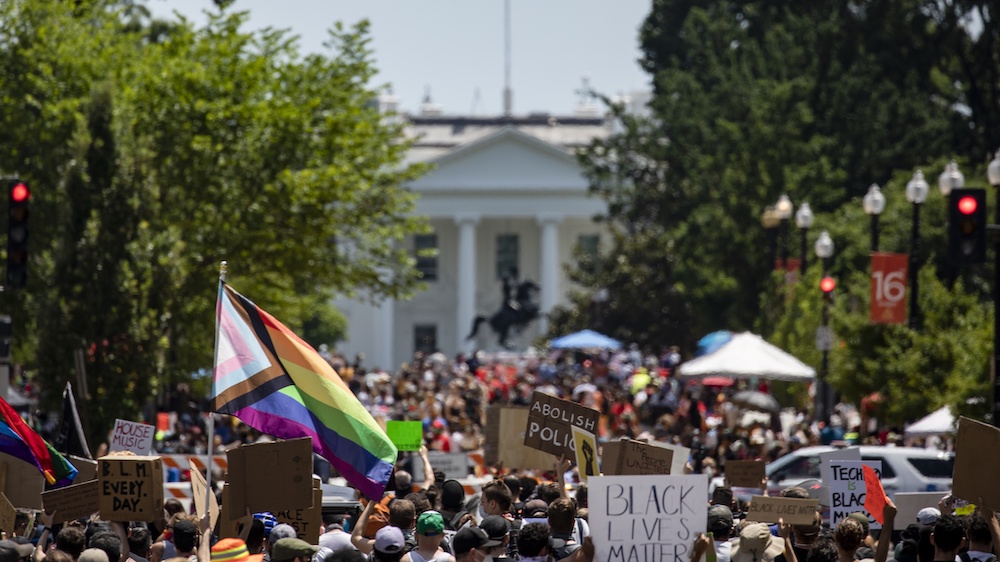If you’re interested in sharing your opinion on any cultural, political or personal topic, create an account here and check out our how-to post to learn more.
Opinions are the writer’s own and not those of Blavity's.
____
Part of George Floyd’s legacy includes changing the trajectory of the lesbian, gay, bisexual, transgender and queer (LGBTQ) rights movement. The same is true about the legacy of Black and brown trans women, like Marsha P. Johnson and Sylvia Rivera, and gender non-conforming people, like Stormé DeLarverie, all of whom fought back against a long history of anti-LGBTQ police brutality at the Stonewall Riots. In the wake of both landmark moments, many LGBTQ people realized that our movement, as we knew it, could never be the same again. And we should all be thankful.
Not many people know about Pride’s precursor, the Annual Reminders. The Reminders were pickets organized by the collective, East Coast Homophile Organizations, and designed as a way to remind Americans that LGBTQ people were locked out of the American promise of life, liberty and the pursuit of happiness. The Reminders took place each year starting in 1965. Days after what would become their final picket in 1969, the Stonewall Riots began, prompting The Reminders’ organizers to restrategize their efforts going forward. That is how the Christopher Street Liberation Day of 1970 started, an occasion we now recognize as the first Pride. Yet, even though Black and brown trans women catalyzed a massive change in our movement, a fact that took years for our community to honor, the visibility of this history, and other moments like the Compton’s Cafeteria riot, and our revolutionary origins generally, dwindled over time.
George Floyd’s legacy has changed this trajectory.
I venture to guess that a major reason why so many of us plugged into the global reckoning on race is that a critical mass of people representing all walks of life collectively felt what it was like to have their joys, opportunities, rights and liberties — essentially, our humanity — severely circumscribed. Or, maybe it was simply because the footage of Floyd’s murder was so devastating, or our attentions were so undivided in quarantine, or the body count too large that we felt we no longer had the option to choose moral cowardice by retreating into our busy lives. We were sitting in a collective pain too impossible to ignore. We had to find the source of this pain and fight back, and many in our community did so by holding up the origins of Pride, moving to center intersectional activism in Pride, demanding that our LGBTQ leaders and organizations do more for racial justice, and urging corporations to play a more active role in our fight for our liberation.
“Daddy changed the world.” That’s what Floyd’s daughter, Gianna, said while witnessing the throngs of people demanding justice for her father while she sat on the shoulders of NBA player Stephen Jackson. Gianna was right. Floyd changed the world — like the Black and brown trans women at Stonewall, like the Black and brown trans women engaging in the fight for liberation today, like Black voters — especially Black women — in the recent presidential and Georgia Senate elections, and Black people throughout history. I will take it a step further and say that Black people and our allies saved the world, because I do not think our world, much less our democracy, would have survived another four years of Trump.
When we erase our history, we create opportunities for anti-equality forces to further subjugate us. The unprecedented attacks on our trans and non-binary family this year in state legislatures across the country hold the same intention as those of “yesteryears” — to target vulnerable populations like the LGBTQ community as a wedge to achieve supremacy. It is a tale that we have seen play out many times before, and one that will keep repeating itself if our community does not remain vigilant, unite across differences and focus our activism on strategically defeating the numerous threats facing our lives and futures.
We can not forget Stonewall, and we can not forget George Floyd. We have to hold them both close to heart as if they were a life force. And we must see the same underlying threats at play in both moments, and all battles for liberation. Otherwise, we will be fooled into thinking that another person’s battle is not our own.
This Pride month, let us enter the month with the intention to center intersectional activism and to develop new strategies to effectively meet the challenges of the moment, including wading through difficult conversations about race, class, gender and sexuality; widening our chosen families by making connections across differences; strengthening and building bonds by choosing to celebrate in joyful and safe communion; holding the legacies of George Floyd, and the Black and brown trans women and gender non-conforming people leading our movement at Stonewall and beyond, as inspiration for what we can accomplish when we unite and fight for justice. These are the tools that will help disable our opponents from exploiting a most advantageous point of attack — our divisions — and will set us on a strong path to achieve our goal to liberate all LGBTQ people. Happy Pride.
____
Alphonso David is the president of the Human Rights Campaign.
